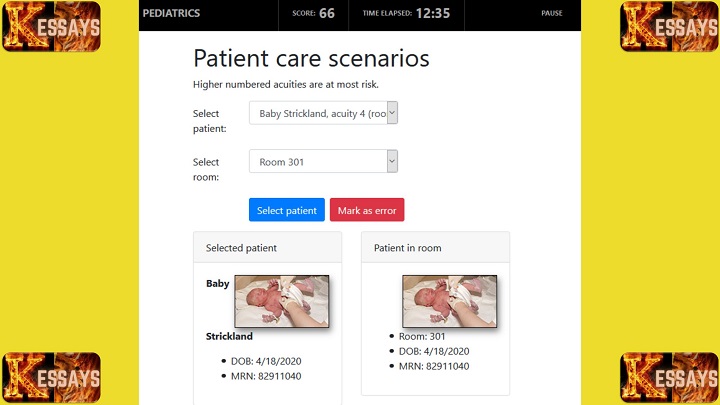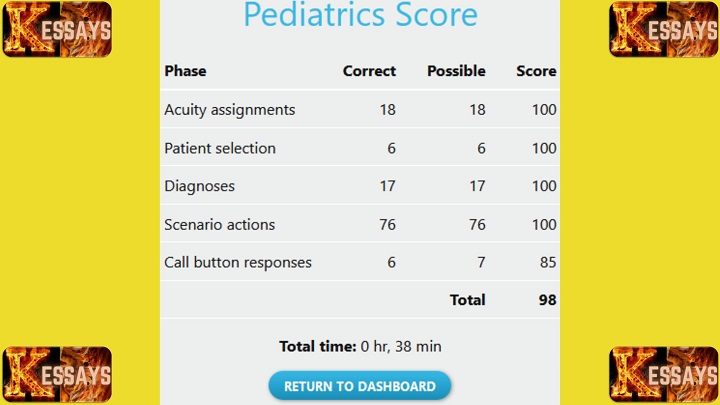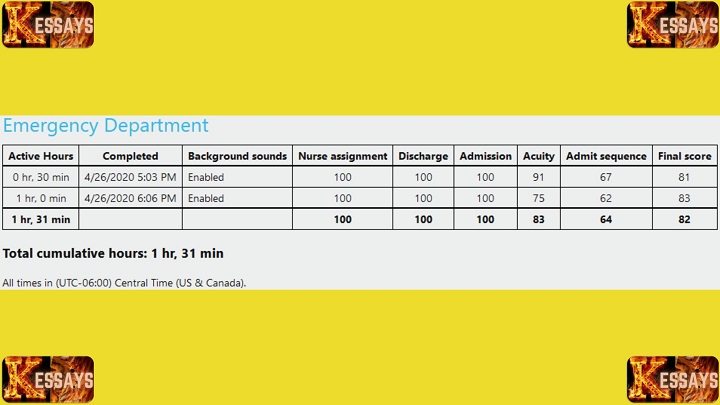Swift River Virtual Clinicals is a cutting-edge educational platform that offers students a unique learning experience in healthcare simulation. As part of their training, students encounter complex patient scenarios and are required to provide accurate and thoughtful responses. In this comprehensive article, we will delve into Swift River Virtual Clinicals Answers, providing expert insights and examples to enhance understanding and proficiency.




 Through continuous self-assessment, practice, collaborative learning, and utilizing available resources, students can enhance their proficiency in Swift River Virtual Clinicals Answers. This will not only benefit their educational journey but also prepare them to excel in real-world healthcare settings, ensuring the delivery of safe and quality patient care.
Through continuous self-assessment, practice, collaborative learning, and utilizing available resources, students can enhance their proficiency in Swift River Virtual Clinicals Answers. This will not only benefit their educational journey but also prepare them to excel in real-world healthcare settings, ensuring the delivery of safe and quality patient care.

I. Swift River Virtual Clinicals: Enhancing Clinical Decision-Making Skills
Swift River Virtual Clinicals is designed to simulate real-world clinical scenarios, allowing students to apply their theoretical knowledge and develop critical thinking and clinical decision-making skills. The platform presents students with patient cases, requiring them to analyze data, interpret clinical information, and make informed judgments to provide appropriate care. Swift River Virtual Clinicals Answers play a crucial role in this process, as they demonstrate students' ability to integrate knowledge, prioritize interventions, and communicate effectively in a healthcare setting. Students must demonstrate clinical competence by selecting the most appropriate responses that align with evidence-based practice and patient-centered care. Example: In a Swift River Virtual Clinical scenario, a student may encounter a patient with chest pain. They are asked to prioritize interventions, which may include administering aspirin, obtaining an electrocardiogram (ECG), and monitoring vital signs. The student's answer should reflect their understanding of the immediate actions necessary in such a situation.
II. Components of Effective Swift River Virtual Clinicals Answers
To provide effective Swift River Virtual Clinicals Answers, students should consider the following components:- Accurate Assessment: Students must gather relevant information from the patient scenario, including vital signs, medical history, and presenting symptoms. This enables a comprehensive understanding of the patient's condition and guides appropriate interventions.
- Critical Thinking: Swift River Virtual Clinicals aims to enhance students' critical thinking skills. Effective answers should demonstrate logical reasoning, analysis of available data, and the ability to identify potential complications or risks associated with the patient's condition.
- Evidence-Based Practice: Swift River Virtual Clinicals Answers should reflect an understanding of evidence-based practice. Students must incorporate current guidelines, best practices, and clinical protocols into their responses, ensuring they align with the most up-to-date recommendations.
- Communication and Collaboration: Effective communication is vital in healthcare settings. Swift River Virtual Clinicals Answers should demonstrate the ability to communicate clearly and effectively with patients, families, and interdisciplinary healthcare teams.

III. Enhancing Swift River Virtual Clinicals Answer Skills
To enhance proficiency in Swift River Virtual Clinicals Answers, students can employ various strategies:- Self-Assessment: Students should regularly evaluate their performance and identify areas for improvement. Reviewing feedback from instructors and seeking self-assessment tools can help pinpoint strengths and weaknesses in answering Swift River Virtual Clinicals scenarios.
- Practice and Repetition: Like any skill, answering virtual clinical scenarios requires practice. Engaging in repetitive practice through additional virtual clinical scenarios or case studies can enhance critical thinking, decision-making, and response accuracy.
- Collaborative Learning: Participating in group discussions or engaging in peer-to-peer learning can be beneficial. Collaborative learning allows students to exchange ideas, share experiences, and gain insights from different perspectives.
- Utilize Available Resources: Students should make use of available resources such as textbooks, scholarly articles, and clinical guidelines to expand their knowledge base. Keeping up with the latest research and developments in healthcare practices enhances the quality of Swift River Virtual Clinicals Answers.
- Seek Expert Guidance: Consulting with experienced healthcare professionals or instructors can provide valuable insights and guidance. Their expertise can help students understand complex patient scenarios, navigate challenging situations, and refine their approach to answering Swift River Virtual Clinicals scenarios.
- Reflective Practice: Engaging in reflective practice allows students to critically analyze their performance, identify areas of improvement, and develop strategies to enhance their skills. Reflecting on past experiences and considering alternative approaches can lead to growth and improved performance in Swift River Virtual Clinicals Answers.
- Time Management: Efficient time management is crucial when responding to virtual clinical scenarios. Students should practice managing their time effectively to ensure they address all relevant aspects of the patient scenario within the given timeframe. This includes prioritizing interventions, considering potential complications, and communicating essential information.
- Stay Updated: Healthcare is a dynamic field, with new research, guidelines, and practices emerging regularly. Students should stay updated with the latest advancements in healthcare by subscribing to reputable journals, attending conferences, and participating in professional development activities. This knowledge will contribute to providing evidence-based Swift River Virtual Clinicals Answers.
- Seek Feedback: Actively seeking feedback from instructors or mentors can provide valuable insights into strengths and areas for improvement. Feedback allows students to refine their approach, address weaknesses, and continually enhance their Swift River Virtual Clinicals Answers.
- Real-Life Application: Connecting virtual clinical scenarios to real-life experiences can deepen understanding and improve Swift River Virtual Clinicals Answers. Students can relate patient scenarios to actual clinical encounters they have observed or experienced, applying their knowledge in practical contexts.

Conclusion
In conclusion, refining Swift River Virtual Clinicals Answer skills requires dedication, practice, and a commitment to continuous improvement. By employing strategies such as self-assessment, practice, collaboration, utilizing available resources, seeking expert guidance, reflective practice, time management, staying updated, seeking feedback, and relating virtual scenarios to real-life experiences, students can excel in providing comprehensive and accurate Swift River Virtual Clinicals Answers. Mastering Swift River Virtual Clinicals Answers not only enhances students' educational journey but also prepares them for real-world healthcare settings. By developing critical thinking, clinical decision-making, and effective communication skills, students can become competent healthcare professionals capable of delivering safe and high-quality patient care. Swift River Virtual Clinicals Answers are an integral part of healthcare simulation education, allowing students to apply their theoretical knowledge and develop critical thinking skills. By accurately assessing patient scenarios, incorporating evidence-based practice, and demonstrating effective communication, students can provide comprehensive and thoughtful answers. Through continuous self-assessment, practice, collaborative learning, and utilizing available resources, students can enhance their proficiency in Swift River Virtual Clinicals Answers. This will not only benefit their educational journey but also prepare them to excel in real-world healthcare settings, ensuring the delivery of safe and quality patient care.
Through continuous self-assessment, practice, collaborative learning, and utilizing available resources, students can enhance their proficiency in Swift River Virtual Clinicals Answers. This will not only benefit their educational journey but also prepare them to excel in real-world healthcare settings, ensuring the delivery of safe and quality patient care.